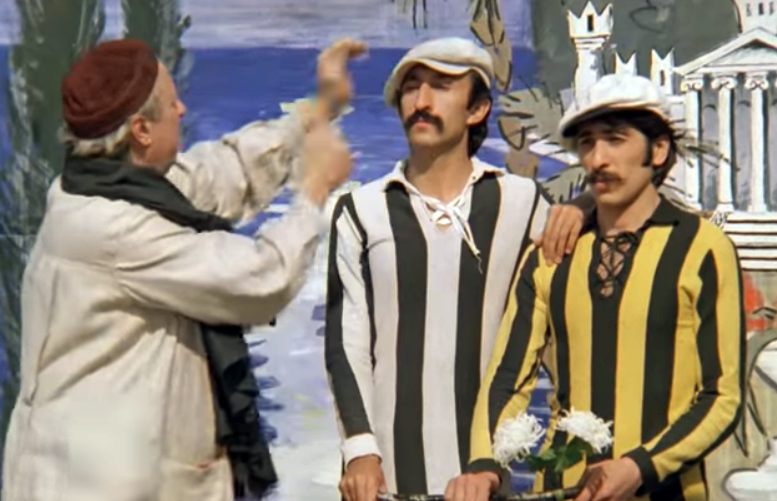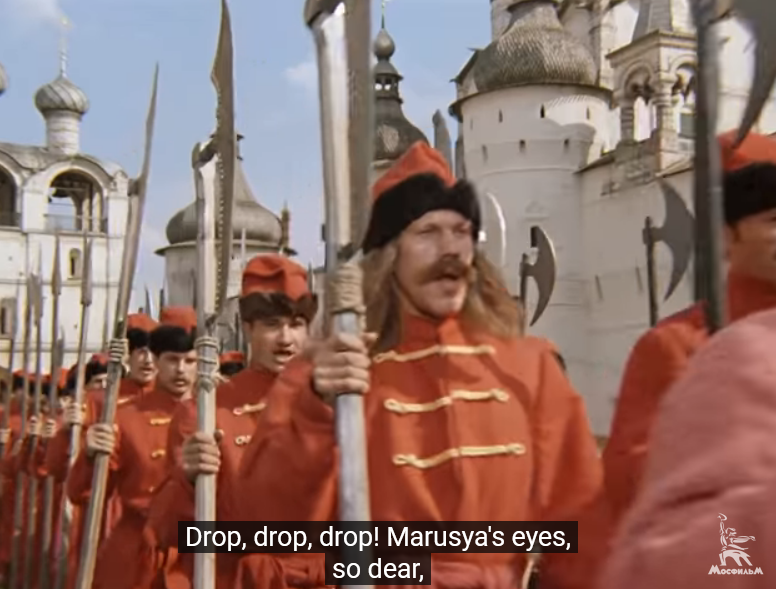Crowd-pleasing madcap comedies probably aren’t the first thing that come to mind when you think of Soviet cinema, but by the 60s and 70s they were very popular, and are still beloved by people across the former USSR. Among the best of them are the films of Leonid Gaidai, a Russian genius who could be likened to Capra or Wilder, and who made three of the top ten highest-grossing films in the country’s history; a string of hits that you can stream free of charge on Mosfilm’s website.
Gaidai emerged at the tail end of Khrushchev’s post-Stalin “thaw,” and the beginning of the Brezhnev years. A cautious optimism prevailed in this period, after decades of war and political repression; masses of people suddenly enjoyed luxuries like having their own apartments (small and hastily constructed though they were), consumer goods (however dubious in quality), freedom to travel (within the USSR), and peace at home and abroad (though with the threat of instant nuclear annihilation hanging over everything, but hey, that’s true everywhere, right?) All these relative comforts came, however, at the price of political disengagement, and a nagging awareness that incorrect behavior still had serious consequences. As that long period of stagnation set in, Soviet society was in an absurd situation begging for the right kind of humor.
At first glance Gaidai’s films, loaded as they are with slapstick and sight gags, owe a lot to Charlie Chaplin and Buster Keaton. There are charming rogues, cartoon villains, and ridiculously inflexible bureaucracies. There’s lots of shouting, clowning, and gesturing to the heavens—but it doesn’t take long to realize that these films are about more than they appear.
Gaidai was as careful a craftsman as he was a storyteller; he knew how to make his jokes land. Of his ruthless editing process he once said, “I cry, but I cut.”
As a Peoples’ Artist of the Soviet Union who enjoyed a long and happy career, Gaidai pushed the boundaries only gently. He was a master at negotiating official censorship, including the tactic of leaving one big glaring no-no in his final cuts, in hopes the smaller ones would survive. Once, to express his personal pacifist beliefs, he ended a film with documentary footage of a nuclear explosion. That was clearly against the rules, but the censors didn’t bother with other transgressions that had flooded in ahead of it—having a main character become drunk, portraying an incompetent border guard, and a racy-for-its-time striptease scene.
—Christopher Marcisz
A kindhearted Soviet everyman named Semyon (played by Gaidai regular Yuri Nikulin) reluctantly goes on a cruise to the Mediterranean and gets mixed up in a jewel-smuggling scheme. The Diamond Arm (1968) plays on Gaidai’s favorite themes: the honest virtue of ordinary people, the comic harmlessness of greedy villains, and just under the surface, the state and its police apparatus as a benevolent natural fact. The supporting characters are finely drawn, including Gyesha (played by Andrei Mironov), a charming fop who moonlights as a model and has icons in his flat, and Semyon’s stoic wife Nadia, played by Gaidai’s IRL wife Nina Grebeshkova. Many of the film’s jokes became catchphrases for generations of Russians—for example, a nosy house committee member notices Semyon constantly taking cabs offered by the police, and suspiciously notes, “Our people don’t take taxis to the bakery.”
Once Gaidai’s reputation was established, he moved on from the cartoonish themes of his early films, like Moonshiners and The Caucasian Prisoner, and began to draw on classic satirical writing from the early Soviet years.
In 1971, he adapted Twelve Chairs by Ilf and Petrov. Con man Ostap Bender (the “son of a Turkish citizen”) and an impoverished aristocrat named Ippolit Vorobyaninov roam the countryside after the Revolution, chasing rumors of lost treasure. There were many adaptations of the story at the time—even a version by Mel Brooks in 1970, starring Frank Langella and Dom DeLuise—but Gaidai’s is the best retelling.
Ivan Vasilievich Changes Professions
Based on a play by Mikhail Bulgakov. author of The Master and Margarita, Ivan Vasilievich Changes Professions (1973) is a light sci-fi farce about a brilliant yet neglected scientist who builds a time machine in his apartment. One day he accidentally sends his nosy building committee chairman (you may notice a trend here) and an unlucky burglar back in time, and returns Ivan the Terrible—or more precisely, a manifestation of him drawn completely from Sergei Eisenstein’s groundbreaking and very serious film of the previous generation. The acclaimed actor Yuri Yakovlev is perfectly cast as both Ivan and house committee chairman Ivan Bunsha — leaving it up to the audience to compare and contrast the full-blast tyranny of a legendary despot and the petty harassment of a neighborhood busybody.

In 1975, Gaidai filmed a series of tales set in the 1920s that becomes nearly subversive, in its aptness to the times. A corrupt merchant, interesting because in the 70s official corruption was a way of life. An impressively chaste tale about the ridiculous complications of wife-swapping, at a time when social dramas about divorce and family breakdown were common. The third, a cautionary tale about marrying in haste, concerns a bridegroom who neglects to get a look at his future wife without her hat and scarf on.
Set in the advanced tourist economy of the south (most likely Crimea), this one is about a lost lottery ticket. It’s a satire about consumer culture, with plenty of jokes about the relentless sameness of what was available to Soviet citizens at the time—a major plot point revolves around everyone reading the same popular thriller, titled Deadly Murder! Bathers are stuffed onto the beaches like sardines, and even an adventurous mountain trek follows a carefully prescribed path where tourists are asked not to frighten the wild animals.
The consumerist culture of the west comes in for a share of mockery, as well. The hero, a shy nerd named Kostya, at one point apologizes for offering someone a Baikal, an ersatz Soviet cola beverage. “I would have preferred Pepsi,” he stoically asserts. “But I like Baikal better.”
The Popula Film Club brings you worthwhile options to stream, chosen with a view to quality, and to withholding as much money as possible from the oligarchs and monopolists of Amazon, Netflix, YouTube and the like.
Please send your recommendations to submissions@popula.com with the subject line, POPULA FILM CLUB.







